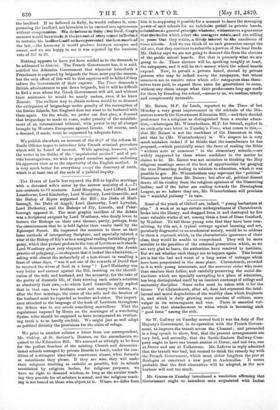The House of Lords has rejected the Bill to legalize
marriage with a deceased wife's sister by the narrow majority of 4,-77 non-contents to 73 contents. Lord Houghton, Lord Lifford, Lord Lansdowne, Lord Kimberley, Lord Westbury, Lord Granville, and the Bishop of Ripon supported the Bill ; the Duke of Marl- borough, the Duke of Argyll, Lord Harrowby, Lord Lyveden, Lord Hatherley, and the Bishops of Ely, Lincoln, and Peter- borough opposed it. The most graphic incident of the .debate was a Scriptural exegesis by Lord Westbury, who dearly loves to lecture the Bishops on their own themes, partly, perhaps, from the consciousness that he is held lighter than vanity itself by the Episcopal Bench. He improved the occasion to them on their loose methods of interpreting Scripture, and especially refuted a view of the Bishop of Ely's as to a marginal reading forbidding poly- gamy, which that prelate prefers to the text of Leviticus as it stands. Lord Westbury grew very eloquent in demonstrating the Jewish practice of polygamy,—so eloquent that it looked like admiration,— asking with almost the melancholy of a bon-vivant in recalling a feast of other days, "was it not one of the rewards of David that he received the wives of Saul in a lump " ? Lord Hatherley was very bitter and earnest against the Bill, insisting on the identifi- cation of the wife and husband, and the necessity, for the sake of the purity of domestic life, of their viewing each other's relatives as absolutely their own,—to which Lord Granville aptly replied that in that case two brothers must not marry two sisters, as, after the first marriage, the sister of the wife and the brother of the husband must be regarded as brother and sister. The import- ance attached to the language of the book of Leviticus throughout the debate was to our minds something marvellous. That the regulations imposed by Moses on the marriages of a wandering Syrian tribe should be supposed to have incorporated an everlast- ing truth is to us hardly credible. We might just as well adopt as political divinity the provisions for the cities of refuge.






























 Previous page
Previous page